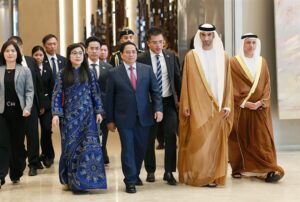HÀ NỘI ( WNAM MONITORING): Prime Minister Phạm Minh Chính, his spouse and a high-ranking Vietnamese delegation arrived on Sunday at Zayed International Airport, Abu Dhabi, to begin an official visit to the United Arab Emirates (UAE) at the invitation of UAE President Mohamed bin Zayed Al Nahyan.
Welcoming PM Chính at the airport were UAE Minister of State for Foreign Trade and Minister in charge of Talent Attraction and Retention Thani Bin Ahmed Al Zayoudi, Vietnamese Ambassador to the UAE Nguyễn Thanh Diệp, staff of the Vietnamese Embassy and representatives of the Vietnamese community in the UAE.
During the official visit to the UAE, Chính is scheduled to hold talks with UAE President Mohammed Bin Zayed Al Nahyan, the UAE’s Prime Minister and Vice President Sheikh Mohammed Bin Rasheed AL Makhtoum.
On this occasion, the two countries will upgrade their relations with many bilateral cooperation documents expected to be signed.
Speaking to the press about the PM’s trip to the Middle Eastern countries, Deputy Minister of Foreign Affairs Nguyễn Minh Hằng said his official visits to the United Arab Emirates (UAE) and Qatar, and his working trip to Saudi Arabia for the 8th Edition of the Future Investment Initiative (FII) from October 27 to November 1, will be significant, strengthening political trust and fostering economic, trade and investment ties between Việt Nam and the three Gulf nations.
The visits are the first official ones to the UAE and Qatar by a Vietnamese PM over the past 15 years and the first-ever visit to Saudi Arabia since the two countries established diplomatic relations. This also marks the first time the PM is invited as the chief guest and the only high-ranking leader in Asia to address the FII.
She stressed that the UAE, Qatar, and Saudi Arabia, along with the broader Gulf region, are not only major partners, markets and investors, but also financial and technology hubs, offering vast potential for cooperation with Việt Nam.
The PM’s visits and attendance at the FII are practical steps in realising the 13th National Party Congress’s foreign policy of multilateralisation and diversification of external ties, active and proactive international integration, with a priority to the diversification of markets, partners and supply chains, contributing to reinforcing an environment of peace and cooperation, while maximising resources for national development, she said.
In Việt Nam’s foreign policy, the UAE, Saudi Arabia and Qatar are identified as important, long-term and comprehensive partners in various fields in the Middle East. These countries also view Việt Nam as a key partner in Southeast Asia, aligning with their ‘Look East’ policy.
Relations between Việt Nam and the UAE, Saudi Arabia and Qatar have been growing, with increasingly close cooperation and mutual support at various multilateral forums, Hằng said.
The UAE stands as Việt Nam’s largest export market in the Middle East and Africa, with two-way trade reaching US$4.7 billion in 2023. In the first seven months of this year’s Việt Nam exports to the UAE surged by 51 per cent year on year to $3.37 billion. The two countries are negotiating a Comprehensive Economic Partnership Agreement (CEPA), aiming to conclude the negotiations during the PM’s visit. As of June 2024, the UAE had 41 projects valued at $71.6 million in Việt Nam, while there are about 3,000 Vietnamese workers in the UAE.
Saudi Arabia is Việt Nam’s third largest trading partner in the Middle East and North Africa, with two-way trade hitting $2.68 billion in 2023. Major economic groups from Saudi Arabia are increasingly interested in Việt Nam, and there are around 4,000 Vietnamese workers in the country.
Meanwhile, Qatar, with its strong potential in energy and finance, presents significant economic and investment opportunities for Việt Nam. Two-way trade amounted to $497.2 million in 2023, up 32 per cent year on year. The Qatar Investment Authority (QIA) has been actively studying and accelerating investment projects, particularly in the fields of real estate and industry in Việt Nam. Progress has also been made in education and labour cooperation.

